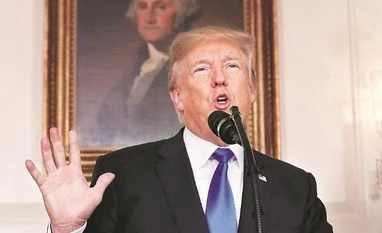US President Donald Trump is to declare the opioid crisis a "nationwide public health emergency," stepping up the fight against an epidemic that kills more than 100 Americans every day, officials said.
Trump is to make the announcement at an event at the White House later today attended by former addicts and parents of victims, the senior administration officials said.
Trump has repeatedly said, as recently as yesterday, that he planned to declare a "national emergency" to fight the abuse of opioids such as Percocet, OxyContin, heroin and fentanyl.
A national emergency gives states access to federal disaster relief funds but the officials said a public health emergency declaration was more appropriate in battling a longterm crisis such as the opioid epidemic.
The declaration does not provide any increased federal funding to address the crisis but the officials said the White House would seek more money from Congress to do so.
The officials said the public health emergency declaration lasts for 90 days and can be renewed repeatedly.
It will allow the Department of Labor, for example, to provide dislocated worker grants to opioid addicts to help them break what an official called the "cycle of addiction and unemployment."
It will also provide increased access to telemedicine treatment for people in rural areas such as Appalachia and the Rust Belt, which have been particularly hard hit by the opioid crisis.
Trump is to make the announcement at an event at the White House later today attended by former addicts and parents of victims, the senior administration officials said.
Trump has repeatedly said, as recently as yesterday, that he planned to declare a "national emergency" to fight the abuse of opioids such as Percocet, OxyContin, heroin and fentanyl.
Also Read
But the officials said that instead of declaring a national emergency, the president would order the acting secretary of health and human services to announce a "nationwide public health emergency."
A national emergency gives states access to federal disaster relief funds but the officials said a public health emergency declaration was more appropriate in battling a longterm crisis such as the opioid epidemic.
The declaration does not provide any increased federal funding to address the crisis but the officials said the White House would seek more money from Congress to do so.
The officials said the public health emergency declaration lasts for 90 days and can be renewed repeatedly.
It will allow the Department of Labor, for example, to provide dislocated worker grants to opioid addicts to help them break what an official called the "cycle of addiction and unemployment."
It will also provide increased access to telemedicine treatment for people in rural areas such as Appalachia and the Rust Belt, which have been particularly hard hit by the opioid crisis.
)